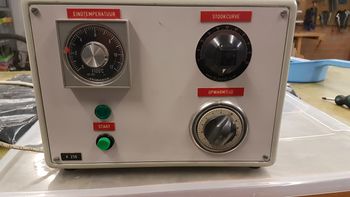Keramiek Oven Controller: Difference between revisions
(Digital controller for the ceramic kiln) |
No edit summary |
||
| (One intermediate revision by the same user not shown) | |||
| Line 12: | Line 12: | ||
== Summary == | == Summary == | ||
The kiln only has manual operation right now, where the operator chooses the maximum temperature, time and rate. This works for some materials, but other require more | The kiln only has manual operation right now, where the operator chooses the maximum temperature, time and rate. This works for some materials, but other require more advanced control, so we will make it digital. With a triac, the already present thermocouple (and an accompanying thermocouple amplifier) and an arduino/esp8266 | ||
== Important Features == | == Important Features == | ||
| Line 19: | Line 19: | ||
** Timer | ** Timer | ||
** Maximum Temperature | ** Maximum Temperature | ||
* | * Using PID | ||
== Cool Features == | == Cool Features == | ||
| Line 37: | Line 36: | ||
</gallery> | </gallery> | ||
== | == 2018/12/28 == | ||
We tested the triac with an arduino, it worked perfectly. We will probably power the arduino with one of the US USB port power supplies. | We tested the triac with an arduino, it worked perfectly. We will probably power the arduino with one of the US USB port power supplies. | ||
== 2018/2/23 == | |||
The controller will have an input of 5 buttons and 3 displays (2 x 4 Digit 7 segment for Actual and Target Temp and 1 x 16x2 LCD to show Kp Ki Kd, time, selected profile etc.) The oven's current theromocouple (k-type) will be attached to a MAX31855 (Range of about -270 to +1800 C, resolution of .25C), which itself will be attached to the arduino. The final component is a 480D10-12 solid state relay. | |||
The code will use the Brett Beauregard PID library (there may be a better choice but I liked reading the explanation of PID on his [http://brettbeauregard.com/blog/category/pid/ website]) as well as the LCD library and the 4D7S code from an old project. | |||
Latest revision as of 17:09, 23 February 2019
| Project Keramiek Oven Controller | |
|---|---|

| |
| Digital controller for the ceramic kiln | |
| Status | Initializing |
| Contact | Ash |
| Last Update | 2019-02-23 |
See also Keramiekoven
Summary
The kiln only has manual operation right now, where the operator chooses the maximum temperature, time and rate. This works for some materials, but other require more advanced control, so we will make it digital. With a triac, the already present thermocouple (and an accompanying thermocouple amplifier) and an arduino/esp8266
Important Features
- Can reproduce old Controller's functions
- Rate Control (assuming linear)
- Timer
- Maximum Temperature
- Using PID
Cool Features
- Allow for multiple stored "profiles" of temps, rates and times
- Make the controller, and profile creator, accessible online
- Record power consumption
- Design a nice faceplate to replace the controller's current one
Old Controller
Very simple and analog, operates at 240 AC and toggles a LC1D2501 contactor at frequencies above 1/60 of a hertz. Below are the internals, a simple sketch of how it is wired might be added later.
2018/12/28
We tested the triac with an arduino, it worked perfectly. We will probably power the arduino with one of the US USB port power supplies.
2018/2/23
The controller will have an input of 5 buttons and 3 displays (2 x 4 Digit 7 segment for Actual and Target Temp and 1 x 16x2 LCD to show Kp Ki Kd, time, selected profile etc.) The oven's current theromocouple (k-type) will be attached to a MAX31855 (Range of about -270 to +1800 C, resolution of .25C), which itself will be attached to the arduino. The final component is a 480D10-12 solid state relay.
The code will use the Brett Beauregard PID library (there may be a better choice but I liked reading the explanation of PID on his website) as well as the LCD library and the 4D7S code from an old project.


